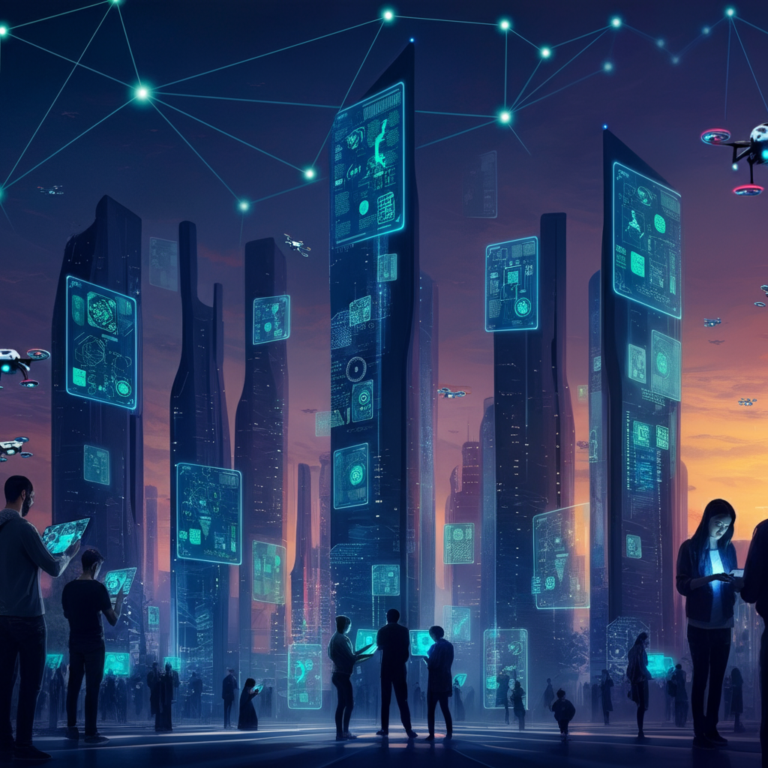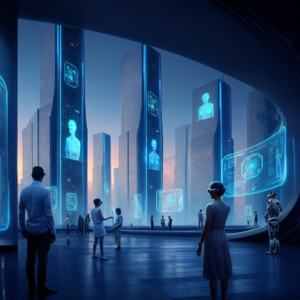Artificial intelligence (AI) is no longer a concept relegated to the pages of science fiction novels or the screens of futuristic movies. It is a part of our daily lives, powering everything from virtual assistants like Alexa and Siri to intricate algorithms that recommend what you should binge-watch next on Netflix. But what if artificial intelligence went one step further? What if AI governed the world? This intriguing question is not as far-fetched as it may seem, especially as advancements in AI continue to accelerate at an unprecedented rate.
This blog will explore the current role of AI in society, its potential to revolutionize industries, and the ethical dilemmas that accompany such enormous power. We’ll also analyze its benefits, examine existing AI-driven solutions, and consider steps to ensure a positive AI-driven future. By the end, you’ll have a comprehensive understanding of the profound implications of a world potentially governed by artificial intelligence.
AI Today: Its Growing Influence in Society
Artificial intelligence already influences nearly every facet of our lives, often without us realizing it. At its core, AI refers to machines or systems capable of performing tasks that typically require human intelligence, such as learning, problem-solving, and decision-making.
Today, we rely on AI for:
- Healthcare: Diagnosing diseases with greater accuracy through predictive analytics.
- Transportation: AI underpins driverless car technologies such as Tesla’s Autopilot mode.
- Finance: Banks and institutions use AI for fraud detection and algorithmic trading.
- E-commerce: Personalized shopping recommendations from Amazon or dynamic pricing on airline tickets.
- Customer Service: Chatbots powered by AI handle customer queries 24/7.
With these applications already transforming our day-to-day interactions, it’s no surprise that the idea of AI ruling the world sparks curiosity—and concern.
The Potential Impact of an AI-Governed World
Imagine a world where AI governs key aspects of human society—from law enforcement to urban planning, from education to environmental conservation. The use of AI in global governance may lead to faster decision-making processes and reduced biases in areas such as:
Healthcare
AI could manage public health systems by analyzing disease outbreaks in real time, ensuring equitable vaccine distribution, and improving life expectancy through predictive health monitoring.
Education
AI-driven technologies could personalize education for students of all ages, ensuring every individual gets the resources, teaching style, and attention they need to thrive.
Urban Planning
Smart cities, powered by AI, could optimize traffic flows, reduce energy consumption, and improve public spaces, making urban living more sustainable and efficient.
Law Enforcement
AI could assist in solving complex crimes through advanced analytics while eliminating human prejudice in criminal profiling and judgments (if designed ethically).
The Ethical Challenges of AI Leadership
Despite its potential upsides, AI ruling the world raises some significant challenges.
Privacy Concerns
The more data AI needs to make decisions, the more vulnerable society becomes to data breaches and surveillance misuse. Maintaining privacy while deploying AI will be a key issue.
Job Displacement
An AI-driven world could render many jobs obsolete, displacing millions of workers in industries from manufacturing to services. Even white-collar jobs could be at risk as AI becomes capable of tasks like legal drafting or financial planning.
Accountability
If AI systems make critical decisions—like who receives medical treatment first or how budgets are allocated—who is held accountable when things go wrong? The creators? The operators? These gray areas are far from resolved.
Ethical Programming
One of the most important challenges relates to biases within AI systems. If a machine is trained on data sets that carry societal biases, those same biases could perpetuate or escalate upon implementation.
The Benefits of AI Governance
While ethical challenges exist, we can’t overlook the numerous potential benefits of having AI at the helm.
- Data-Driven Objectivity: Unlike humans, AI does not base decisions on emotions, biases, or personal agendas, making its governance more objective when programmed responsibly.
- Improved Problem-Solving: With access to vast amounts of data, AI could identify and solve problems that currently seem unsolvable, such as curing major diseases or combating climate change.
- Efficiency: AI systems operate far faster than any human, analyzing data and acting on it in milliseconds. This speed could dramatically reduce decision-making lag times during emergencies.
Real-Life Case Studies of AI Enhancing Society
To understand the feasibility of AI governance, we can look at current applications already making strides in problem-solving and decision-making.
IBM Watson in Healthcare
IBM’s Watson AI has been used to recommend cancer treatments personalized to individual patients—something previously reliant on exhaustive tests and specialist consultations.
Google’s DeepMind in Energy
Google’s DeepMind reduced energy consumption in its data centers by 40% through its AI-powered energy efficiency algorithms, paving the way for sustainable AI applications.
AI in Disaster Response
The United Nations has partnered with AI experts to develop technologies that predict natural disasters and coordinate effective response strategies, saving lives in high-risk zones.
These examples demonstrate that AI, with the right intentions and oversight, can make significant contributions to society’s well-being.
The Future Outlook of AI as a Global Leader
If AI-led governance is to be realized, thoughtful planning will be essential. Here’s how we can shape a future where AI serves humanity positively:
- Ethics-Driven Development: Engineers and policymakers must collaborate to ensure ethical frameworks guide AI innovation, especially around bias, fairness, and accountability.
- Transparency: Open algorithms and auditable decision-making processes should be mandated to build trust in AI-led systems.
- Education and Workforce Transition: Governments and businesses must invest in upskilling and reskilling programs to prepare workers for the jobs of the future.
- AI Policy Regulations: International bodies may need to establish enforceable laws that govern AI’s global implications, striking a balance between innovation and control.
Why Discussing AI’s Governance Today Matters
Whether you view it as a utopian dream or a dystopian nightmare, the idea of AI ruling the world raises important questions about the role of technology in shaping our future. Will it create a fairer, more efficient society? Or will unchecked innovation exacerbate inequalities and ethical dilemmas?
These discussions need to happen now—before AI’s capabilities surpass our readiness to manage them. A collaborative, proactive approach involving tech leaders, governments, and communities is our best chance of navigating this futuristic frontier.
AI is here to stay. How it rules, however, is up to us.







